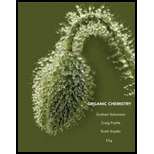
Organic Chemistry
11th Edition
ISBN: 9781118133576
Author: T. W. Graham Solomons, Craig Fryhle
Publisher: Wiley, John & Sons, Incorporated
expand_more
expand_more
format_list_bulleted
Question
Chapter 15, Problem 27P
Interpretation Introduction
Interpretation:
The mechanism which accounts for the formation of products in the given reaction is to be provided.
Concept introduction:
Conjugated dienes undergo 1,2-addition and 1,4 –addition through the formation of allylic carbocations.
Expert Solution & Answer
Want to see the full answer?
Check out a sample textbook solution
Students have asked these similar questions
C.
NaOMe,
Br
Br
a.
Most Acidic
B
H
C
H
H
A
Least Acidic
a.
H3C
CH3
H, 1.0 equiv. Br2
Chapter 15 Solutions
Organic Chemistry
Ch. 15 - PRACTICE PROBLEM 15.1
Show how loss of a proton...Ch. 15 - Prob. 2PPCh. 15 - PRACTICE PROBLEM 15.3
Outline all steps in a...Ch. 15 - PRACTICE PROBLEM 15.4 Provide a mechanism that...Ch. 15 - Prob. 5PPCh. 15 - PRACTICE PROBLEM
15.6 Explain how the percentages...Ch. 15 - PRACTICE PROBLEM
15.7
Predict the major products...Ch. 15 - Prob. 8PPCh. 15 - Prob. 9PPCh. 15 - Prob. 10PP
Ch. 15 - PRACTICE PROBLEM 15.8 Write resonance structures...Ch. 15 - PRACTICE PROBLEM 15.9
Provide a mechanism for the...Ch. 15 - PRACTICE PROBLEM 15.13
Write mechanisms for the...Ch. 15 - Prob. 14PPCh. 15 - PRACTICE PROBLEM 15.15
Suppose you needed to...Ch. 15 - PRACTICE PROBLEM
15.16 Predict the major product...Ch. 15 - PRACTICE PROBLEM Account for the following...Ch. 15 - PRACTICE PROBLEM 1-Chloro-3-methyl-2-butene...Ch. 15 - Prob. 19PPCh. 15 - PRACTICE PROBLEM
15.20 The following chlorides (Ph...Ch. 15 - Prob. 21PPCh. 15 - Provide a detailed mechanism for each of the...Ch. 15 - 15.34 Provide a detailed mechanism for the...Ch. 15 - Prob. 24PCh. 15 - Many polycyclic aromatic compounds have been...Ch. 15 - Prob. 26PCh. 15 - Prob. 27PCh. 15 - Predict the major product (or products) formed...Ch. 15 - Prob. 29PCh. 15 - Prob. 30PCh. 15 - Predict the major products of the following...Ch. 15 - Prob. 32PCh. 15 - Prob. 33PCh. 15 - Prob. 34PCh. 15 - Starting with aniline, outline a synthesis of each...Ch. 15 - Prob. 36PCh. 15 - 15.37 Propose structures for compounds G–I:
Ch. 15 - 2,6-Dichlorophenol has been isolated from the...Ch. 15 - 2-Methylnaphthalene can be synthesized from...Ch. 15 - Show how you might synthesize each of the...Ch. 15 - Prob. 41PCh. 15 - Prob. 42PCh. 15 - 15.47 Provide structures for compounds A and B:
Ch. 15 - Prob. 44PCh. 15 - Prob. 45PCh. 15 - Treating cyclohexene with acetyl chloride and...Ch. 15 - 15.47 The tert-butyl group can be used as a...Ch. 15 - When toluene is sulfonated (concentrated H2SO4) at...Ch. 15 - Prob. 49PCh. 15 - 15.50 Heating 1,1,1-triphenylmethanol with ethanol...Ch. 15 - 15.51
(a) Which of the following halides would you...Ch. 15 - Furan undergoes electrophilic aromatic...Ch. 15 - 15.61 Acetanilide was subjected to the following...Ch. 15 - Prob. 54PCh. 15 - When compound C, which is often used to model a...Ch. 15 - The structure of thyroxine, a thyroid hormone that...Ch. 15 - Prob. 2LGPCh. 15 - 3. Deduce the structures of compounds E–L in the...Ch. 15 - Which of the following compounds would be most...Ch. 15 - 15.2 Which of the following is not a...Ch. 15 - Prob. 3QCh. 15 - Complete the following syntheses.
Knowledge Booster
Similar questions
- H3C. H3C CH 3 CH 3 CH3 1. LDA 2. PhSeCl 3. H2O2arrow_forwardPlease predict the products for each of the following reactions: 1.03 2. H₂O NaNH, 1. n-BuLi 2. Mel A H₂ 10 9 0 H2SO4, H₂O HgSO4 Pd or Pt (catalyst) B 9 2 n-BuLi ♡ D2 (deuterium) Lindlar's Catalyst 1. NaNH2 2. EtBr Na, ND3 (deuterium) 2. H₂O2, NaOH 1. (Sia)2BH с Darrow_forwardin the scope of ontario SCH4U grade 12 course, please show ALL workarrow_forward
- Is the chemical reaction CuCl42-(green) + 4H2O <==> Cu(H2O)42+(blue) + 4Cl- exothermic or endothermic?arrow_forwardIf we react tetraethoxypropane with hydrazine, what is the product obtained (explain its formula). State the reason why the corresponding dialdehyde is not used.arrow_forwarddrawing, no aiarrow_forward
- If CH3COCH2CH(OCH3)2 (4,4-dimethoxy-2-butanone) and hydrazine react, two isomeric products are formed. State their structure and which will be the majority.arrow_forward+ Reset Provide the correct IUPAC name for the compound shown here. 4-methylhept-2-ene (Z)- (E)- 1-6-5-2-3-4- cyclo iso tert- sec- di tri hept hex oct meth eth pent ane yne ene ylarrow_forward+ Provide the correct IUPAC name for the compound shown here. Reset H3C H H C CH3 CH-CH3 1-3-methylpent ene trans- cis- 5-6-3-1-2-4- tert- tri sec- di cyclo iso but pent hex meth prop eth yl ane ene yne ☑arrow_forward
arrow_back_ios
SEE MORE QUESTIONS
arrow_forward_ios
Recommended textbooks for you
 Organic ChemistryChemistryISBN:9781305580350Author:William H. Brown, Brent L. Iverson, Eric Anslyn, Christopher S. FootePublisher:Cengage Learning
Organic ChemistryChemistryISBN:9781305580350Author:William H. Brown, Brent L. Iverson, Eric Anslyn, Christopher S. FootePublisher:Cengage Learning

Organic Chemistry
Chemistry
ISBN:9781305580350
Author:William H. Brown, Brent L. Iverson, Eric Anslyn, Christopher S. Foote
Publisher:Cengage Learning